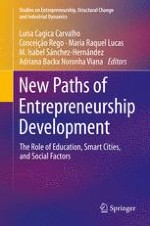2019 | OriginalPaper | Buchkapitel
How Social Entrepreneurship Promotes Sustainable Development: With Some Examples from Developed and Developing Countries
verfasst von : Paulo Bento, Marc Jacquinet, Rosana Albuquerque
Erschienen in: New Paths of Entrepreneurship Development
Verlag: Springer International Publishing
Aktivieren Sie unsere intelligente Suche, um passende Fachinhalte oder Patente zu finden.
Wählen Sie Textabschnitte aus um mit Künstlicher Intelligenz passenden Patente zu finden. powered by
Markieren Sie Textabschnitte, um KI-gestützt weitere passende Inhalte zu finden. powered by
